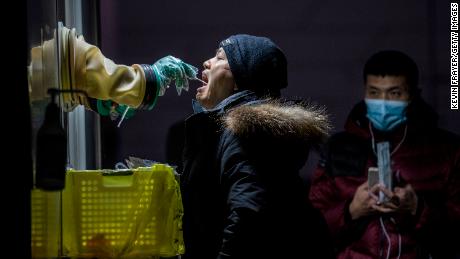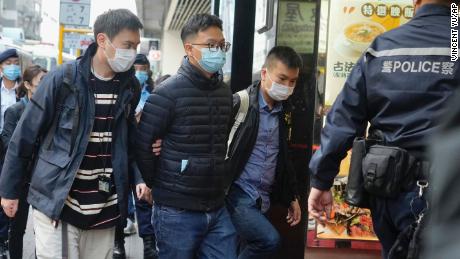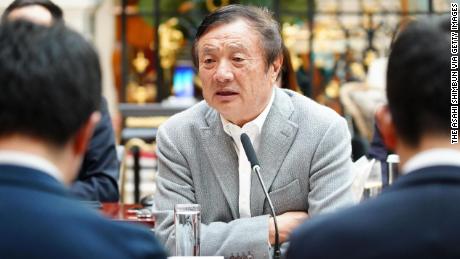Hong Kong (CNN Business)As he spent decades building one of the biggest tech companies on the planet, Ren Zhengfei kept a low public profile.
The billionaire founder of Chinese telecoms equipment giant Huawei rarely spoke to the media, letting his company's rapid growth around the world do the talking.
That's changing as Huawei finds itself threatened by a US campaign targeting its global operations. Ren, 74, is now pulling back the curtain on his company, his family and his life. He says the challenges Huawei faces are nothing out of the ordinary for him.
"I think there's always difficulties for me," he told CNN in an interview on Wednesday. "I never had smooth sailing because when I was young, my family background wasn't good. I had to work really hard to get even just a little bit of employment opportunity."
The college kid serving in China's military
Ren's time in the Chinese military has drawn widespread attention.
He joined the People's Liberation Army (PLA) as an engineer in 1974, during China's Cultural Revolution when the country was suffering from severe food and clothing shortages.
"At that time, there was chaos almost everywhere," Ren told reporters in January. He recalled that textile rations were so scarce that most people barely had enough to patch and repair clothes.
Ren was tasked with setting up a chemical factory to make textile fibers in northeast China, part of the communist government's plans to ensure every citizen had at least one decent piece of clothing.
"I had been to college, and people like me could play a role," he said.
Ren and his military comrades slept in shabby housing in subzero temperatures, living on pickled vegetables for months at a time. But he said he was happy at the time because while people elsewhere in China were being criticized for reading too many books during the Cultural Revolution, the factory "was probably one of the few places that people could read."
Ren said his hopes of becoming a lieutenant-colonel in the PLA were undermined by his family background. During the Cultural Revolution, his father had been labeled a "capitalist roader" ŌĆö someone attempting to restore capitalism and overthrow socialism ŌĆö making it hard for Ren to become a member of the ruling Communist Party.
After Ren successfully reverse engineered a tool that was needed to test equipment at the fiber factory, a supervisor helped him become a party member. But Ren never made it to military rank. His last job with the PLA was deputy director of a construction research institute.
Founding a tech giant
After the PLA, Ren spent a few years working for an oil company before founding Huawei in 1987.
China's market transformation was in full swing, and the country's poor telecommunications infrastructure was holding back progress.
Developing the industry became a priority for policy makers, and three state-owned enterprises ŌĆö Great Dragon, Datang and ZTE (ZTCOF) ŌĆö emerged as the dominant players.
Huawei was an outlier. It was registered as a private company in Shenzhen, a fishing village that had just been designated as a special economic zone in China.
In the beginning, the company traded equipment and was dismissed as a minor vendor, according to "The Huawei Way," a book authored by Tian Tao. Tao is a member of the Huawei International Advisory Council, an organization affiliated with the company, and works at Zhejiang University.
Huawei struggled to gain market share, and Ren suffered "serious depression and anxiety during the darkest days of the company," Tao wrote.
Ren pushed employees to work long hours and do whatever it took to secure business. Unable to compete in the big cities, Huawei initially focused on China's small towns and villages. All the while, Ren invested heavily in research and development, pushing Huawei to create its own technology that would enable it to compete with its bigger rivals.
Work before family
Ren worked long hours as well, leaving him little time to build strong relationships with his three children.
He has said that while in the military, he spent just one month a year with his family. After starting Huawei, "I had to fight for the survival of this company, spending 16 hours a day in the office," he said.
Despite the limited time with their father, two of Ren's children have chosen to join him at Huawei.
His eldest daughter, Meng Wanzhou, has spent decades at the company, rising through the ranks to become its chief financial officer. Her high-profile position has put her at the center of the US government's crackdown on Huawei. Meng was arrested in Canada in December and is fighting extradition to the United States to face charges that she committed bank fraud and helped Huawei violate Iran sanctions. She has denied any wrongdoing.
Ren said that he is not close to Meng because his time in the military prevented him from bonding with her when she was young. And even though Meng is one of Huawei's top executives, Ren doesn't directly supervise her, so they don't even have a strong professional connection, he said.
Ren's son, Meng Ping, works at a Huawei subsidiary. Annabel Yao, his daughter from his second marriage, is studying at Harvard University.
Ren said he doesn't have a close relationship with any of his children. He recalled once asking them if they would rather he spend more time with the family or work to "build a platform upon which they could grow."
His children, he said, chose the latter.























